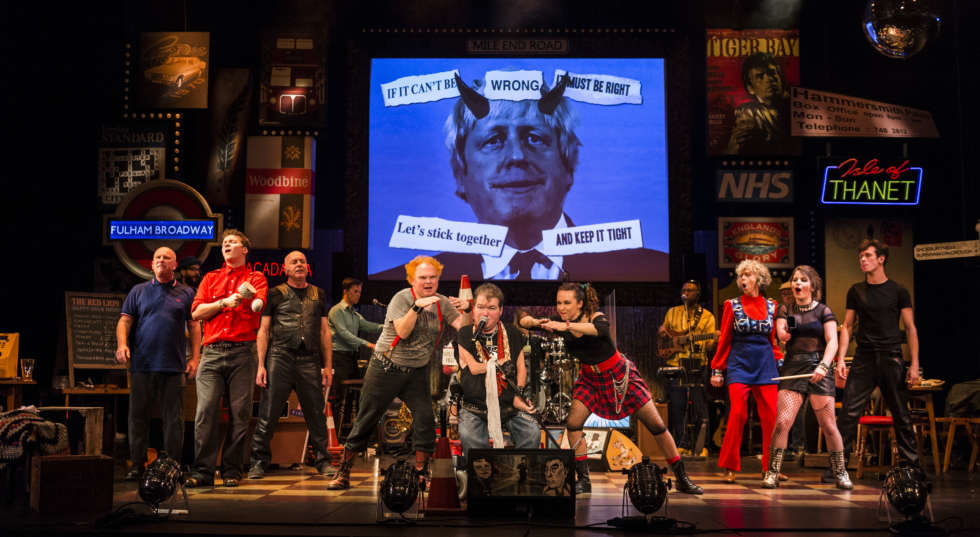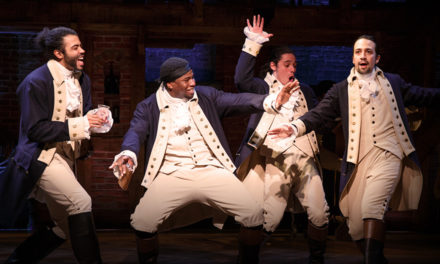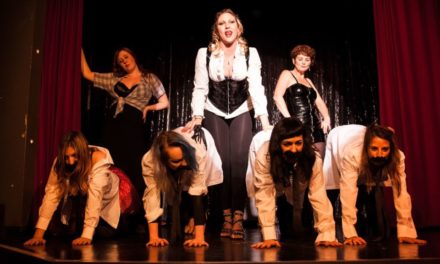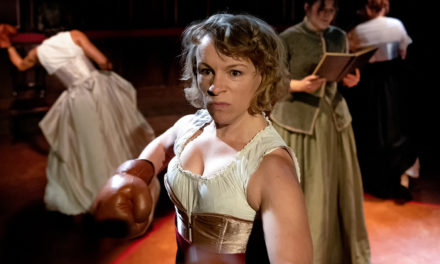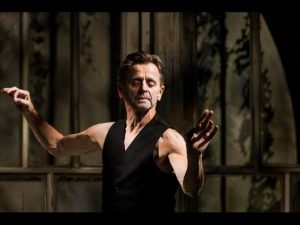My mum invited me to a play called Ubu at the Ovalhouse Theatre, South London in 1994, by a disabled theatre company called Graeae. I had “come out” as a disabled person in 1992 at thirty years old; I yearned to do something aligned with my disability politics and love of performing. As the son of two actors, I wanted to act but I had been put off badly by kids laughing at me in the school play audition at thirteen years old, the only disabled kid in my school. I had carried with me from then on the idea that disabled people on stage were nothing more than an embarrassment to most others. Acting was not a possible career for someone with as visibly different a body as mine.
Then I saw Jamie Beddard, a man with a good dose of cerebral palsy, shouting on stage at everyone else and showing his arse. He was spitting cake at a wheelchair-using woman, Mandy Colleran, who was mocking him and a Deaf woman, Caroline Parker, who was signing. All manner of radically different things unfolded as the whole company romped their way through the bawdiest, anarchic, messy play I had ever seen. And the sold out, mostly non-disabled audience, loved it. No embarrassment but laughter, cheers, applause, and enjoyment. I’ve often tried to describe the feeling that came over me then, a disabled wannabe actor imprisoned by a notion of “body not good enough.” My whole life exploded as I realized there was a place for me to be, to be equal, understood. I had a non-religious epiphany that night. I decided to leave my band the next morning and try to get an audition with Graeae. I was lucky that Ewan Marshall (then artistic director) saw potential in me. I became a member of the company, doing a three-month schools tour of forum theatre with Colette Conroy. I finally got a part in their production of Joe Orton’s What The Butler Saw with Dave Kent, Ilan Dwek, Daryl Beeton, and Jacqui Beckford in 1996-7. From there, I got an Equity card and worked off and on with Graeae for a few years before branching off to do my own work. This disabled theatre company had given me the confidence to perform and a belief that I, as a disabled person, had equal value as an arts creative.
Graeae grew over the next few years, got better funding, and Jenny Sealey took over as artistic director in 1997. Her influence included forming relationships with mainstream theatres, training hungry disabled people in basic theatre skills, and bringing in more and more what we might term “inclusive design,” i.e. building accessibility into the show itself. Additionally, any Graeae show these days has BSL and audio description/stage text built into the script and other areas where possible.
From Nabil Shaban forming Graeae in 1981 to now as I write this thirty-seven years later, the growth, output, professionalism, profile, and international relationships with other theaters and groups has grown to make Graeae the leader in disability-led theatre. I live in the US and there is nothing like Graeae here, although there are some that try to emulate it.

“Graeae are an inspiration to the entire industry. [Reasons To Be Graeae] is a glorious read.” – Rufus Norris, Director of the National Theatre | Photo Credit Oberon Books
Changes to the ethos, such as making the company inclusive in its casting, working on co-productions with mainstream theatres, and making more commercially accessible work have all proved to be successful in raising Graeae’s profile. They are now rightly the most well-known disability-led theatre company in the world. Perhaps more successful is that their influence has reached deep into mainstream UK theatre, which has seen much change although it needs to see and hear a LOT more!
Perseus himself could never have imagined the power those three women crips—the Graeae Sisters had, with only one eye and one tooth between them—when they became the theatre company that saved and made my artistic life, as they have for so many other disabled and non-disabled theatre practitioners.

Photo Credit Oberon Books
This article was originally published on oberonbooks.wordpress.com. Reposted with permission. Read the original article.
This post was written by the author in their personal capacity.The opinions expressed in this article are the author’s own and do not reflect the view of The Theatre Times, their staff or collaborators.
This post was written by Mat Fraser.
The views expressed here belong to the author and do not necessarily reflect our views and opinions.

